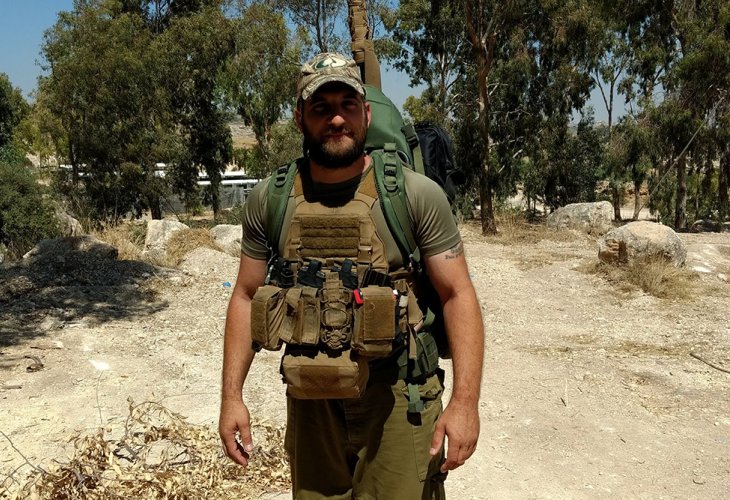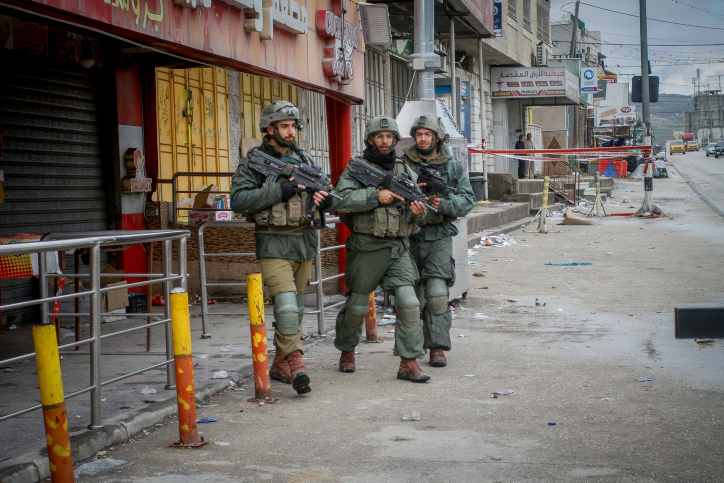"The Terrorist Looked My Way, and I Remembered My Marine Training": David Stern Recalls the Miracle in Huwara
David Stern, a veteran of the U.S. Marine Corps, returned to faith during his service and moved to Israel where he joined the IDF. As an instructor for the next generation of IDF snipers, he thought he'd seen it all—until an encounter with a terrorist proved otherwise.
 David Stern
David SternThe calm voice of David Stern masks the courage of the former Marine fighter, who as a young American made his journey back to faith and moved to Israel. In Israel, he joined the IDF, participates in missions against terrorists, and trains future generations of military snipers, driven by a mission to protect the Jewish people.
The shooting attack in Huwara, Samaria, made Stern (42) known to many Israelis. "It was a rainy day," he recalls the confrontation with the terrorist in the volatile town. "I was driving towards Jerusalem with my wife beside me in the car, navigating through Huwara's dense traffic, when a moment came that, in hindsight, seems I had prepared for my entire life: a confrontation with a terrorist."
When Stern says that the moment on Huwara road was one he prepared for all his life, he means it. This is grounded in his five-year service in the U.S. Marines, more precisely: in the Marines commandos. "The Marine Corps is the naval force of the U.S. military," Stern explains. "It's the intervention force for U.S. missions worldwide, meaning these soldiers must be ready within 24 hours for any mission, effectively making it the American military's commando unit." While the Marines, with about 200,000 fighters, are elite, Stern's unit was its top echelon.
Stern joined the special unit as a young American Jew distant from Torah life. "I decided to enlist because I wanted to face a challenge. Perhaps I saw it as a life preparation, but maybe it was my Jewish soul seeking true meaning that gave me no rest. I remember telling myself during the Marines selection process that serving in this unit would prove to me that if I could do this—I'd be capable of anything." Stern didn't think so in vain; during his service, he underwent grueling training, and his base in North Carolina would deploy him and his comrades worldwide for bloody battles.
What did you do in the Marines?
For security reasons, Stern blurs details of his past in the American military. "I can only say that I was in several combat zones worldwide, mainly in Africa, fighting—under UN guidance—against terror organizations and entities that imposed terror and oppression on local populations. During the service, I faced life-threatening situations six times, and with Hashem's help, we won each time. These events prepared me for the confrontation with the terrorist."
"Service in the Marines was very challenging," he continues. "At that time, we trained worldwide in almost every combat style possible. In my time, Marines conducted a few operations monthly; today, it's likely more intense. For example, during the American military operations in Iraq and Afghanistan, the operation average was much higher, about 50-100 monthly."
Finding Faith for Aliyah
His move to Israel happened after he began strengthening his faith. "In the Marines, I had a lot of free time: without cellphones and no need to work, I had time to ponder why the world was created and the meaning of our lives here. This led me to connect with a Rabbi my New York friends knew, and from there, I returned to faith. At that time, I stayed in the Marines, and alongside fighting and training globally—not able to get kosher food in the unit, I became vegetarian."
After his initial five years, which bound him by contract to the Marines, Stern left quickly, while his comrades extended their service as usual. "The average service in the Marines is about 20 years. I'm among the few who left earlier, due to the difficulty of observing a full Torah lifestyle in that military framework." His departure from the unit had another reason besides wanting to observe a complete Torah life: "I wanted to make Aliyah to Israel. I grew up in a family that loved the holy land. I came here on visits as a child. It was natural that I would come to live here someday," he says.
Stern has, in fact, lived in Israel for nearly two decades. "I've been here since 2002 at intervals, and officially made Aliyah in 2004," he shares.
Where did you settle post-Aliyah?
"I moved to Samaria, as an ideal. Initially, I settled in Tapuach, where I was part of the local rapid response team and trained new recruits. Then I moved to Safed, met my wife there, and decided to return to Samaria, this time to Itamar."
Alongside his resettlement, Stern persisted in joining the IDF: "I served in various army sniper positions. During my military service, I work with snipers in different IDF units, training the new generation of snipers, and often participate in field operations."
As someone who served in both the IDF and the Marines, what differences do you notice between the forces?
"It's hard to compare the Marines to the Israeli force. One must remember the Marines serve as the U.S. Army's rapid response unit," he hints at the advantage in favor of the American elite force but hastens to explain: "Marine fighters choose combat as a career, meaning they serve on average over ten years in the role. In contrast, an IDF soldier—between training completion and service end, it's relatively short when he experiences the field, so it’s expected that he'd be less skilled than a Marine fighter."
"The IDF is a very practical military," Stern continues, "they excel at what they must excel at."
According to him, the gap in favor of the Marines includes a particular variable: the Yamam. "During my IDF service, I also operated alongside the Yamam. Their force is indeed different from the Marines, but they are very professional, and it's tough to point out the more efficient force. It's safe to say the Marines and Yamam are each skilled in the challenges they face. For example, Yamam's expertise is counterterrorism, especially in urban areas. In this, they might be the best globally."
What does it mean for you to serve as a sniper?
"A sniper has to lie down for a long time in ambush or as backup for an active force. It can be very boring. Or not. In Israel, most sniping is in urban areas, at relatively close range—there's no firing from distances like a thousand meters as in the Marines, and there's a lot of work: because you're entering with the forces into the area, and you need to cover the force. Therefore, a sniper in Israel is usually active."
And there are risks, it turns out. "As a sniper, I know there's always a risk of my position being discovered, and it's clear that a sniper team is usually small, and if terrorists discover the team, it's undoubtedly a risk. Still, snipers go out into the field risking their lives. I recently operated with IDF forces. It happened in Nablus; we arrived after intelligence reports of terrorists in the area. Soldiers scanned the area, and we snipers covered them from above."
As an American army veteran, what’s your view on the recent phenomenon of draft refusal among some left-wing segments?
"I think it's mainly sad. As an IDF fighter who goes on operational missions and is also ready to risk his life for the Israeli people, I think there's no place for such nonsense, and anyone who says such a thing should be immediately removed from the military. In the Marines, there's no chance such a thing would happen," he's certain.
A Miracle on the Way to Torah Study
All the training and events undergone during his military service prepared Stern, by special divine providence, for the pivotal event of his life. It happened on the main road in Huwara. At one of the town circles stood a person at the pedestrian crossing. "I stopped to let him cross," he recalls, "then the terrorist began crossing the road, never taking his eyes off me. It was very suspicious to me."
Due to his military background, Stern noticed another suspicious sign: "The terrorist walked with only one visible hand; his other hand was hidden. I tensed, but as long as he didn't draw a weapon, I wouldn't act that way either. Nonetheless, I placed my hand on my regular carry gun, so I could draw quickly. Then he turned, raised the weapon, and simultaneously I drew mine."
"We started shooting almost simultaneously. The terrorist fired first, about half a second before me. In that time, my wife shifted to the right next to the window, and I moved to the left. Simultaneously, I drew my gun and began firing through the windshield. We fired at each other for several seconds. His first shots hit my hand, causing a fracture in my right hand. I shot a burst of rounds at him, but I couldn't know where he was, because the windshield shattered instantly when the shooting began. However, I fired at the place where he initially stood. In the right mirror, I managed to see the terrorist fleeing after a few seconds, and then I ceased fire."
 (Illustration Photo: Nasser Ishtayeh / Flash90)
(Illustration Photo: Nasser Ishtayeh / Flash90)It was a great miracle. The terrorist had an automatic 'Gustav' weapon; Stern only had a regular pistol. Fortunately, he was trained on how to handle such a scenario, simply because he had practiced it numerous times. "As part of my training in the Marines, we learned exactly these scenarios of shooting from a vehicle towards a terrorist. We also learned how to treat our injuries ourselves after being shot, as I did in this case."
Stern's shooting was undoubtedly what saved his life. "From the moment I started shooting, he panicked; he wasn't efficient. I heard from the investigator that I hit him in the hand and shoulder, and he dropped the weapon and fled," he recounts.
Moments after the terrorist fled the scene, Stern drove several hundred meters from the site. "Despite the injury, I decided to advance, fearing there could be more terrorists. I stopped nearby, within Huwara, waiting for rescue forces. We waited there for eight whole minutes. Those minutes felt like eternity to me. But after the forces arrived and began treating me, the magnitude of the miracle became clear. It turned out that every bullet was a miracle in itself. I was hit by four bullets—two in the hand, one in the shoulder and chest, and one in the head. Later, every doctor came separately to tell me how miraculous it was that none of the bullets hit any bones or tendons."
The day after, Stern is not traumatized. At least "I don't think so." He continues to travel the Huwara route. In fact, even if he wanted to, there would be no other choice. Today, this route is a vital path for Itamar residents. "But I have two cars, one bulletproof and one not, and since the attack I've started traveling only in the bulletproof car. Overall, there's no fear. There's faith," he adds.
What’s the feeling in the period after?
"There's a great strengthening of faith. I had very strong faith before, and now I have no doubt that Hashem is standing by my side and protecting me."

